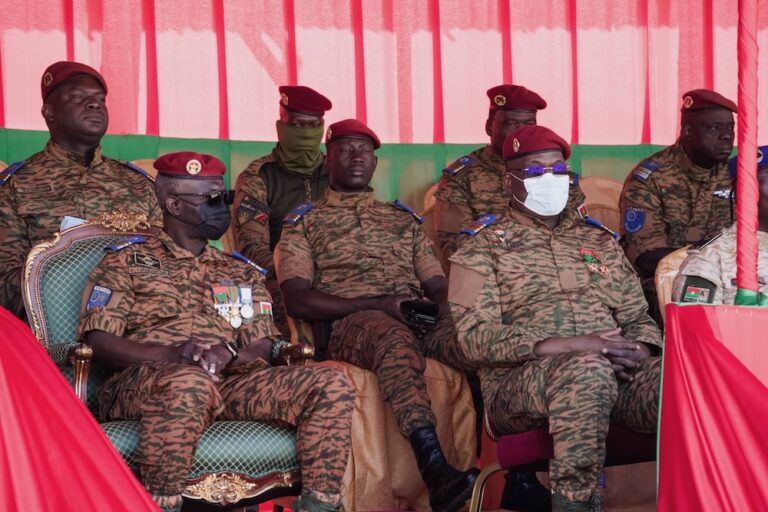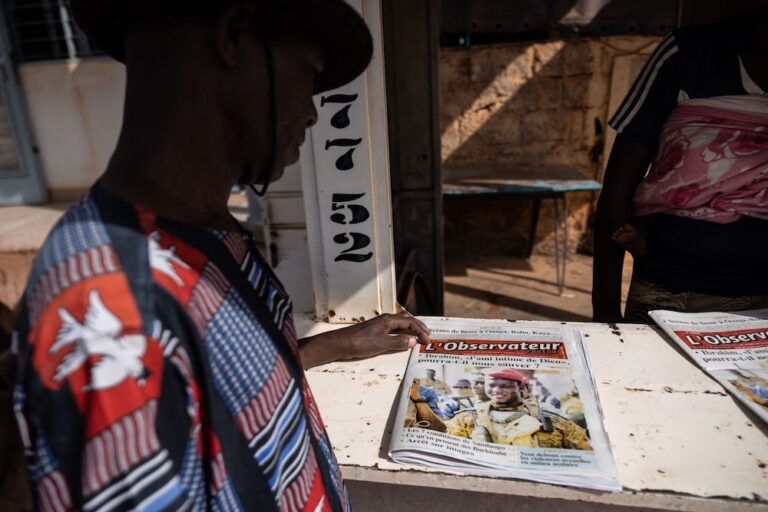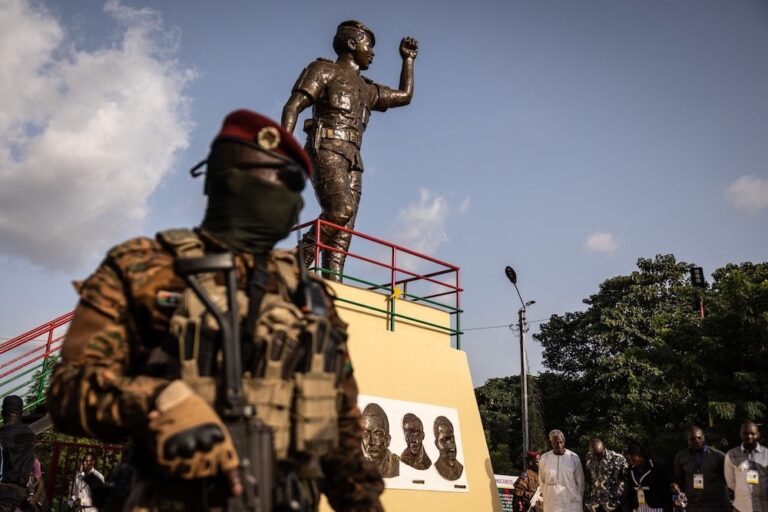(RSF/IFEX) – The following is a 21 August 2000 RSF press release: For immediate release Paris, 21 August 2000 Burkina Faso Three presidential guard soldiers sentenced in the David Ouedraogo case Reporters sans frontières condemns the total immunity enjoyed by the head of state and his brother Reporters sans frontières calls on Burkina Faso authorities […]
(RSF/IFEX) – The following is a 21 August 2000 RSF press release:
For immediate release Paris, 21 August 2000
Burkina Faso
Three presidential guard soldiers sentenced in the David Ouedraogo case
Reporters sans frontières condemns the total immunity enjoyed by the head of state and his brother
Reporters sans frontières calls on Burkina Faso authorities to put an end to the impunity enjoyed by the people behind the murder of David Ouedraogo, the chauffeur of François Compaoré, the president’s brother, and to put on trial and sentence all those responsible for the death of journalist Norbert Zongo. During the night of 19 to 20 August 2000, only those who actually carried out the murder – three presidential guard soldiers – were found guilty of “having illegally confined [David Ouedraogo] and tortured him to death”. Warrant Officer Marcel Kafando and Sergeant Edmond Koama were sentenced to 20 years’ imprisonment and Ousséni Yaro, a soldier, was sentenced to 10 years’ imprisonment. Two other soldiers – Christophe Kombasséré and Marcel Kabré – were acquitted.
Reporters sans frontières cannot be satisfied with a justice system which limits sentences to those who carried out the murder, while those who are actually behind the murder continue to lead the country. It is intolerable that presidential advisor François Compaoré was not found guilty in the David Ouedraogo case, when he is known to have personally telephoned Warrant Officer Marcel Kafando and asked him to detain his chauffeur. Moreover, François Compaoré has yet to be heard by the examining judge overseeing the file of Norbert Zongo, who was assassinated in December 1998 while investigating the death of David Ouedraogo. This two tiered justice system contradicts comments made by the head of state, who suggested in May 1999 that “the government will take all the necessary measures to ensure that the concerned persons respond to the appeals of the courts, without exception.”
Of course, the sentencing of the three soldiers does represent a first step towards the end of the impunity which has been rampant in Burkina Faso for years. However, only those who carried out the murder were tried and sentenced. Neither the head of state nor his brother – both directly implicated in this case – were prosecuted. François Compaoré, who testified at length during the trial, refused to acknowledge any responsibility in the death of his chauffeur and denied that he knew of David Ouedraogo’s detention in the presidential guard’s offices. This directly contradicts statements made by Lieutenant-Colonel Gilbert Diendéré, the president’s chief of staff, who explained in 1999, before members of the independent commission of inquiry looking into the death of journalist Norbert Zongo: “I was not informed on the day of the detention of David Ouedraogo and his friends. I was informed two or three days later. I informed the head of state of the presence of David Ouedraogo and his friends in the barracks. I believe that the report on David Ouedraogo’s death was likely delivered to the head of state before I received it, since it was his aide who informed me of the death, and I was not in Ouagadougou when the events took place.” Moreover, Larba Yarga, who was minister of justice at the time, added before the commission: “(…) I asked that a copy of the minutes [of the police, concerning a case of stolen money and state security implicating David Ouedraogo] be communicated to the head of state. I personally handed over a copy of the minutes to the head of state.”
Why was it that in such circumstances, the head of state was not called to testify during the trial? Is it possible to imagine that the head of state did not inform his brother, a presidential advisor, of David Ouedraogo’s detention for several weeks in the presidential guard’s buildings and of his death in the presidential infirmary? These questions lead us to doubt, once again, of the true independence of Burkina Faso’s justice system.
Marcel Kafando, Edmond Koama, Ousséni Yaro and Christophe Kombasséré were also labelled “serious suspects” in the report of the independent commission of inquiry into the death of Norbert Zongo. The editor of L’Indépendant was investigating the David Ouedraogo case at the time of his assassination, in December 1998. He had come to the conclusion that François Compaoré was implicated in the killing of his chauffeur. In May 1999, the independent commission of inquiry announced that it was necessary to find the motive for the killing of Norbert Zongo “in the investigations undertaken by the journalist over many years, and notably in his recent inquiries into the death of David Ouedraogo, the chauffeur of presidential advisor François Compaoré”.


